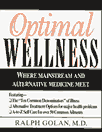![]() Dr.
Golan's Articles
Dr.
Golan's Articles
Yeast Overgrowth Q: I am a 48-year-old female, and I have gained weight that does not want to go away. I exercise and monitor my food intake but have been unable to shed the pounds. I'm also tired all the time, no matter how much sleep I get. I am fuzzy-headed - in a fog all the time, and I cannot get rid of the bloating and gas. I am prone to vaginal yeast infections and have asked my doctor if the other complaints I have could be yeast related. He emphatically says they are not. What do you think? A: Your symptoms sound very suggestive of yeast related illness, an extremely common condition. I would also make sure,however, that your doctor has tested you for a sluggish thyroid (testing your free T4, free T3 and TSH-more on thyroid in a future article) Yeast organisms, Candida albicans, are normal inhabitants of the bowel along with billions of bacteria, some favorable and some unfavorable. When the good bacteria outnumber the yeast and the unfavorable bacteria, there's an excellent chance of good gastrointestinal health, and overall health as well. However, the yeast can overgrow if too many courses of antibiotics kill the good bacteria. Women often get vaginal yeast infections as a result. But both men and women can also get more widespread symptoms from an intestinal overgrowth. When the balance is shifted toward too much yeast, the results frequently include intestinal bloating, gas, diarrhea, constipation and irritable bowel. If the condition worsens, the yeast can release toxins into the bloodstream, causing symptoms elsewhere in the body, such as extreme fatigue, a fuzzy-headed feeling, and sinus or throat irritation. Weight gain can also be a part of the syndrome. As you complain of all these symptoms, I would not be surprised if you experience some of the other common complaints that often affect candida sufferers: recurrent respiratory infections (sinus, bronchial, throat, ear); asthma; depression; headaches; mood swings; recurrent bladder infections; dry, rashy or itchy skin; muscle or joint pains; premenstrual symptoms (often severe); and intolerance to many kinds of fumes such as perfumes, exhaust, cleaning agents, marker pens and smoke. Among my patients, I also suspect that yeast is at work if the symptoms are triggered by eating sweets or drinking alcohol, or if the patient has used oral contraceptives for more than two years, has had any pregnancies (especially more than one), has had prolonged antacid therapy, has used cortisone or immunosuppressant medications, or has undergone chemotherapy or radiation. Do not be surprised if your doctor gets irritated when you suggest that yeast might be related to your symptoms. Only a small (but growing) share of physicians consider the yeast syndrome valid. Most of these are physicians who practice integrative, nutritional or holistic medicine. For patients who are very ill or have complicated cases, it is important to work with such a doctor or another health practitioner who has experience with this syndrome. Many individuals, however, have made quite substantial progress using the self-care program available in books on the subject, such as Dr. William Crook's "The Yeast Connection" or my own book "Optimal Wellness" I test for yeast in my patients using stool and throat cultures, and a blood test for yeast toxins (serum candida antigen). Blood levels of yeast antibodies can also be measured. The tests do not always show the yeast problem, so I rely quite heavily on the symptoms and history each patient presents to me. I may, therefore, decide to treat a patient even if the tests do not substantiate the problem. I usually recommend a treatment consisting of a candida-control diet, supplementation with acidophilus and bifidus bacteria to help rebalance the intestinal flora, and an anti-fungal agent. The diet is a balanced one, with primarily a restriction on sweets. It includes a two-week trial elimination of yeast and mold-containing foods - such as bread, aged cheese, alcoholic beverages and vinegar - as many yeast sufferers develop an allergy to one or more of these items. Reintroduction, one at a time, can usually determine which of these items can be kept in the diet and which still need to be avoided. I also suggest avoiding excessive carbohydrates and, in some individuals who can afford to lose weight, a moderate restriction of carbohydrates, as these can feed the yeast. Anti-fungal agents I often recommend are prescription items like Diflucan, Nystatin and over-the-counter "natural" yeast fighters such as oregano oil, garlic, caprylic acid and others. The detection and treatment of yeast overgrowth can make an important difference in those who are chronically unwell. Whether symptoms involve the gastrointestinal, genitourinary, dermatologic, musculoskeletal, brain, nervous or immune systems, the successful treatment of yeast can provide critical relief.
All rights reserved. Website design, hosting and maintenance by New Tech Web, Inc.
|





